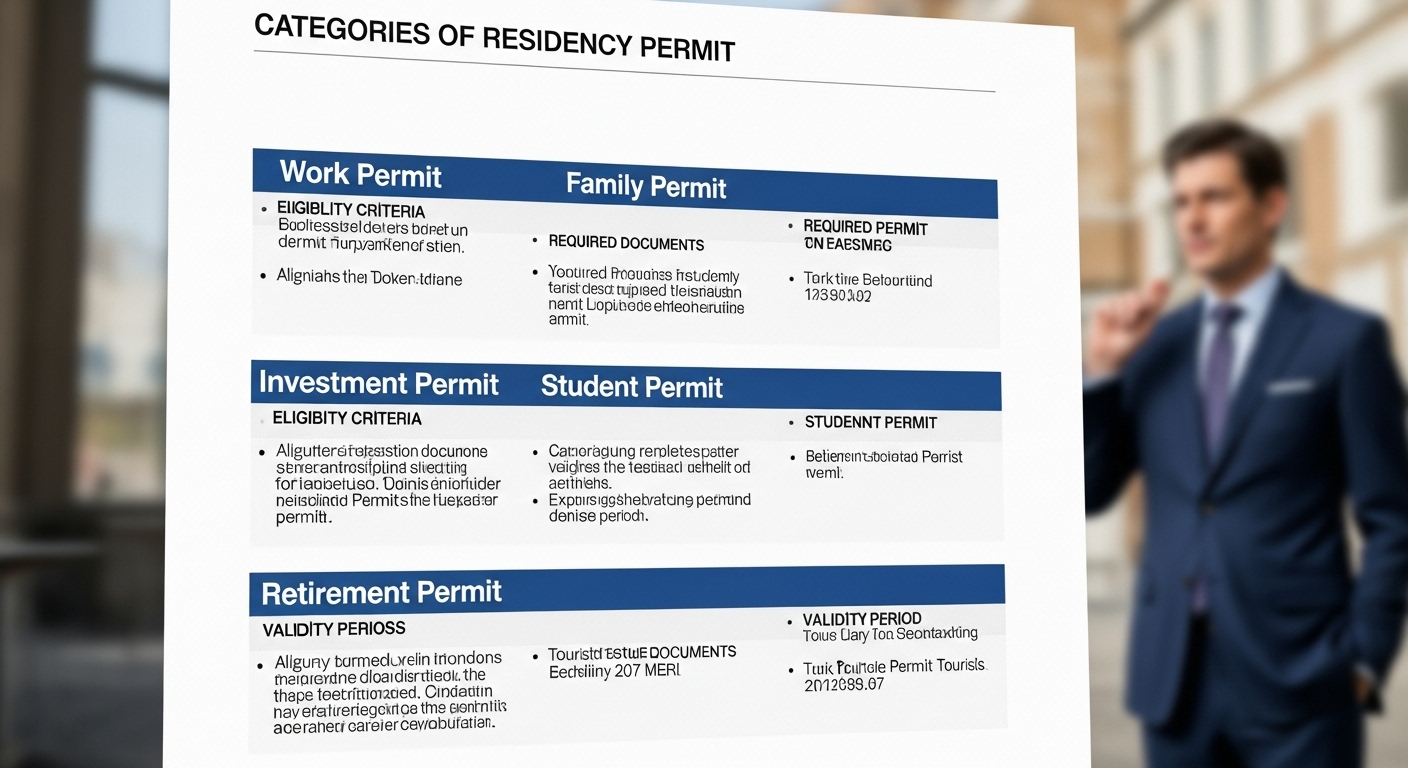How to Get Residency in Turkey — Complete Guide for Expats 2025
Planning to live in Turkey? Learn everything about types, requirements, costs, renewal, family residency permits, and benefits in this complete 2025 guide.

Understanding Residency in Turkey
Dreaming of living by the turquoise beaches of Antalya or enjoying the cosmopolitan buzz of Istanbul? Well, Turkey makes it pretty straightforward for expats to settle here — if you know the ropes. Getting residency in Turkey isn’t as intimidating as you might think, but you do need to understand the basics before you pack your bags.
First things first: there’s no one-size-fits-all permit. Turkey offers multiple residency options to suit different needs, from short-term stays to permanent residency. Whether you’re an expat retiree, a digital nomad, a student, or moving with your family, there’s a permit designed just for you.
The Turkish government has made huge strides in modernizing the process. Most applications are handled online, appointments are easy to book (if you plan ahead!), and renewals can be straightforward — if you stay organized.
Let’s break down the main types of residency permits available in Turkey.
Types of Residency Permits in Turkey
Turkey generally issues the following residency permits:
Short-Term Residency Permit:
The most popular option for tourists, digital nomads, or new expats. Valid for up to 2 years and renewable.
Family Residency Permit:
For spouses, children under 18, and dependent relatives of a Turkish citizen or resident. Valid for up to 3 years.
Student Residency Permit:
Issued to foreign students enrolled in a recognized Turkish university. Duration depends on the length of the course.
Long-Term Residency Permit:
If you’ve lived legally in Turkey for 8 consecutive years, you may qualify for permanent residency.
Humanitarian Residency Permit:
For individuals in special circumstances, such as asylum seekers.
Victims of Human Trafficking Residency Permit:
For those who have been victims of human trafficking, valid for 30 days and renewable.
Knowing which type applies to you is crucial — it affects your application process, required documents, and duration of stay. So, take your time and choose wisely.
Requirements for Turkish Residency
Now that you know which permit fits your situation, let’s tackle the requirements. Turkey is quite clear about what they expect from applicants, and skipping a document could delay your application or get it rejected altogether.
Documents Needed for Residency in Turkey
Generally, you’ll need the following:
A valid passport (must not expire soon!)
Biometric photos (recent and passport-style)
Proof of financial means (bank statement, pension, or salary slip)
Proof of Turkish address (rental contract, property deed, or hotel booking for short stays)
Valid health insurance covering your stay
Completed application form (online)
Tax ID number (easily obtained at the tax office in Turkey)
Application fee receipt (paid at the local tax office or bank)
For a family residency permit in Turkey, you’ll also need:
Marriage certificate (apostilled and translated)
Birth certificates for children (apostilled and translated)
Proof of income from the sponsor (Turkish citizen or resident)
Pro tip: Make sure all foreign documents are apostilled and officially translated into Turkish — unverified documents are the #1 reason applications get stuck.
How to Apply for a Residency Permit in Turkey
Once your paperwork is ready, it’s time to apply. Turkey’s e-ikamet system has made the process simpler than ever — but don’t underestimate the local bureaucracy.
Here’s the step-by-step process:
Online Application:
Visit e-ikamet.goc.gov.tr and fill out the online form. Pick the right permit type and upload the required information.
Book Your Residency Permit Appointment in Turkey:
After submitting the online form, you’ll get a date and time for your in-person interview at the local Immigration Office (Göç İdaresi).
Prepare a Hard Copy File:
Print your application and gather all original documents plus copies. Organize everything neatly in a folder — it makes the appointment smoother.
Attend the Appointment:
Arrive on time, bring your folder, and answer any questions. They might ask for missing documents, so double-check before you go.
Wait for Approval:
If approved, your residence card will be mailed to your address within a few weeks. Keep the slip they give you at the appointment — it proves you’re legal while you wait.
Most importantly, plan ahead! Appointments can fill up fast, especially in big cities like Istanbul or Antalya. It’s smart to apply at least one month before your visa or previous permit expires.
Cost of Residency Permit in Turkey
Let’s talk money. The cost of a residency permit in Turkey depends on your nationality, the type of permit, and how long you want to stay.
On average, here’s what to budget:
| Expense | Estimated Cost (USD) |
|---|---|
| Application Fee | $25 - $80 |
| Residence Card Fee | ~$15 |
| Health Insurance | $50 - $300 (age-dependent) |
| Notary & Translation | $50 - $150 |
| Miscellaneous (copies, photos) | $20 |
So, most people spend $150 - $600 for the whole process.
Additional Fees and Hidden Costs
Keep an eye out for extra costs:
Overstay fines: If your visa expires before your appointment, you may face a fine.
Legal translations: Not all translators are cheap, so get a few quotes.
Courier fees: If you want express delivery for your residence card.
Budget a little extra to avoid surprises — it’s better to be over-prepared than underfunded when dealing with immigration.
Renewing Residency Permit in Turkey
So, you’ve got your residency permit—congratulations! But remember, it doesn’t last forever. Most expats in Turkey need to renew their residency permit every one to two years, depending on the type. This process is pretty similar to applying for the first time but comes with its own quirks that can trip you up if you’re not careful.
When should you renew?
Timing is everything. You must start your renewal process within 60 days before your current permit expires, but not later than the expiry date. Miss this window, and you might have to leave Turkey and reapply from scratch—what a headache!
How to renew:
Fill out the renewal application online at the e-ikamet portal.
Gather updated documents: proof of current address, valid health insurance, new bank statements, and your current residence card.
Book your appointment—yes, again! Even for renewals, you must meet immigration officials.
Attend your appointment on time, provide fingerprints (sometimes waived for renewals), and hand in your updated file.
Most renewals go smoothly if your documents are fresh and complete. Don’t assume last year’s bank statement will work—it won’t.
Common Renewal Mistakes to Avoid
Let’s save you some stress. Here’s what trips up most expats:
Procrastination: Waiting until the last minute can mean missing the appointment window or dealing with crowded immigration offices.
Expired health insurance: Many people forget to renew their policy in time. Without valid insurance, your application can be rejected.
Unpaid fines: If you overstayed your visa in the past, pay those fines before renewing.
Change of address: Moved recently? Update your address officially, or your renewal may get flagged.
A good rule of thumb: treat renewals like your first application—double-check everything and plan ahead.
Family Residency Permit Turkey
Turkey is quite family-friendly when it comes to immigration. If you’re moving with your spouse, kids, or dependent relatives, the family residency permit is your best option.
This permit lets family members live in Turkey legally without needing to apply for individual short-term permits. It’s valid for up to 3 years and is renewable, as long as the sponsor (you or your Turkish spouse) continues to meet the income and housing requirements.
Key benefits:
Children can go to Turkish schools without hassle.
Spouses have access to public services.
It can be a stepping stone to long-term residency or even citizenship.
Who Qualifies for Family Residency?
Here’s who can get a family permit:
Foreign spouse of a Turkish citizen or resident.
Minor children (biological or adopted).
Dependent adult children who can’t support themselves.
What’s required?
Valid marriage certificate or birth certificate, translated and apostilled.
Proof of suitable housing in Turkey.
Income documents showing you can financially support dependents (the threshold is usually the minimum wage per family member).
Health insurance covering the entire family.
One helpful tip: Immigration offices sometimes ask for proof that the marriage is genuine (especially for mixed-nationality couples). They might request wedding photos or ask a few personal questions. Don’t be surprised—this is routine.
Benefits of Turkish Residency
Why do thousands of expats pack up and settle down in Turkey every year? Well, the benefits of Turkish residency are hard to ignore. Whether you want a peaceful retirement, an affordable Mediterranean lifestyle, or a base between Europe and Asia, Turkey ticks all the boxes.
Key perks:
Freedom to stay year-round: No need for constant visa runs.
Access to local services: Open a bank account, register for utilities, and sign up for local health insurance plans.
Property ownership: You can buy and register property under your name, which is often tricky for tourists.
Easy travel: Holders of Turkish residency can come and go more freely than standard tourists.
Path to citizenship: Live continuously for a few years, and you may become eligible to apply for Turkish citizenship (especially through property investment programs).
Long-term Opportunities and Citizenship
If you love Turkey and decide to make it your forever home, your residency can be upgraded to permanent status. After eight years of uninterrupted legal stay, you can apply for a long-term residency permit — this offers nearly all the rights of citizenship (minus voting).
Some expats even go for full citizenship by investing in property worth at least $400,000. This fast-track option is popular among investors who want a Turkish passport.
Tips for a Successful Residency Application
Navigating Turkey’s residency process doesn’t have to be stressful if you plan ahead. Here are some insider tips:
Double-check documents: Missing paperwork causes 90% of delays.
Keep multiple copies: Officials sometimes want extras—better safe than sorry.
Get help if confused: Language barriers can cause mistakes. A good immigration consultant or lawyer can be worth the fee.
Be honest: Don’t fudge your financial proof or address. If caught, you risk fines or a ban.
Stay polite: Turkish immigration officers appreciate respectful applicants. It goes a long way!
Should You Hire a Consultant?
Honestly? It depends on your comfort level. If you’re familiar with Turkey and have solid Turkish language skills, you can handle it solo. But for families, property investors, or first-timers, a consultant can save time and headaches. Just make sure they’re licensed and have good reviews.
Have Question Or Suggestion ?
Please Share Your Thought, To Make It Real


